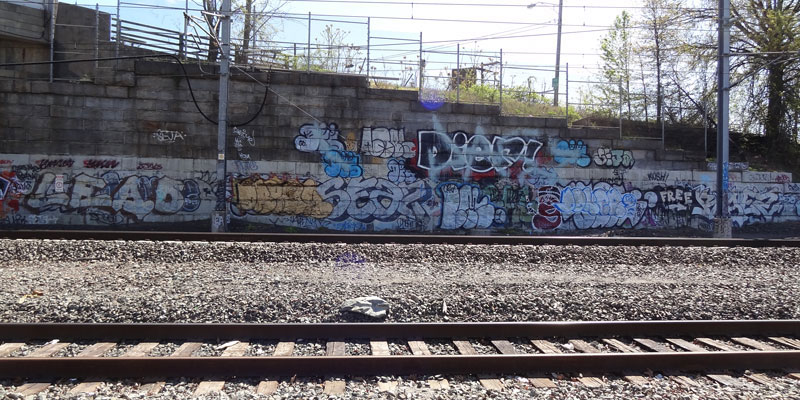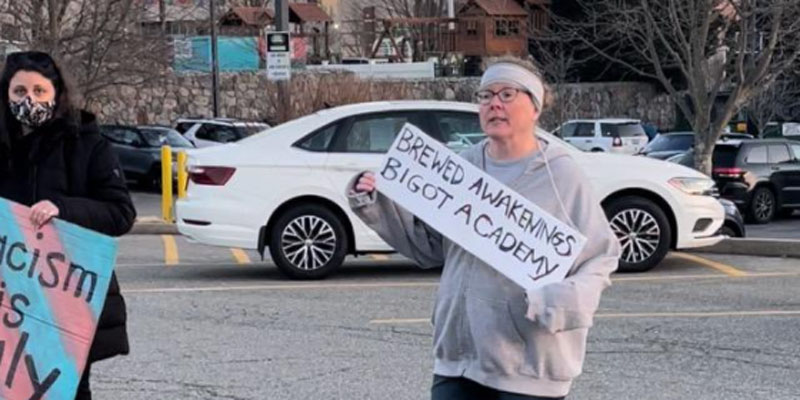Of course, I agree with Erika Sanzi across the board on the issues she mentions in her latest Valley Breeze op-ed. Support for school choice and opposition to vaccine and mask mandates, radical gender ideology, and racial indoctrination — check, check, check, and check.
For that reason, I want to issue a little bit of a warning about this conclusion upon attending an event in D.C.:
I was in the presence of the moderate middle, people from different political persuasions who find the extremes in both parties tiresome, unhinged, and useless when it comes to solving problems. My gut tells me that most of us find ourselves somewhere in this moderate middle, regardless of party affiliation or political philosophy. At the moment, the most active and engaged subgroup within the moderate middle seems to be parents. They are Democrats, Republicans, independents, and apolitical types who only became political when COVID brought school into their kitchen and living room. What remains to be seen is what this bipartisan parent movement will mean come election time, but after the victory of Glenn Youngkin in Virginia’s governor’s race and the successful recall of three school board members in San Francisco, I’m confident it will mean something.
Framing this coalition as the “moderate middle” is wrong for at least four reasons.
First, the members aren’t necessarily “moderate” in their feelings about the issues that bring them together or about others. They’re in such fervent agreement on their coalition’s core concerns that they are willing to put other differences aside.
Second, this group isn’t really a “middle.” Being non-extreme leaves a whole lot of Left and Right in play that can’t be assigned as the “middle,” because then most people will be in the “middle” most of the time.
Third, Sanzi’s “middle” isn’t really pinned between two groups. Its constituents are aligned against the radical woke Left. That fact does not make it a conservative movement, but it’s far too easy to fall prey to divisive internecine “both-sidesism” if the movement builds in a need to imagine somethign it opposes on the right that isn’t fundamentally applicable to its core mission.
This point leads us to: Fourth, promoting a “moderate middle” brand leaves the movement vulnerable to erosion. Once people are thinking of themselves in those terms, they are susceptible to disingenuous calls to denounce one ally or another as “immoderate.” Their motivating grievances will be diluted with the impulse to make them fit the moderate brand.
Featured image by Eran Menashri on Unsplash.
[Open full post]More frequently than I liked, during my years reading the thousands of bills submitted in the Rhode Island General Assembly each year, I’d come across one that made me wonder how anybody could submit such a thing. Legislators couldn’t truly be representative of their constituents if they were expected to be the uber academics we sometimes seem to expect them to be, but we should reasonably expect some minimum diligence to understand the repercussions of their proposals.
Along those line, the attempt of far-left Democrat Representative Brianna Henries (East Providence) to ban single-family zoning not only shows utter contempt for many, if not most, of the people she’s supposed to represent, but also would spell disaster for the state:
Henries went a step farther, linking single-family zoning to a long-standing history of racism in Rhode Island which, along with the lending practice known as redlining, “banned non-white [people] from living in affluent neighborhoods where generational wealth could be built.”
She called the prohibitions on multi-family housing in many neighborhoods “a purposeful decision by our state and others to segregate our community to ensure that non-white residents would never — or could never — economically compete with white residents.”
The careless condescension of insisting that the only reason people support limits on the density of housing around them must be racism is remarkable. Her position is illogical, too. Single-family neighborhoods are desirable and, therefore, more valuable to everybody; hollowing out communities such that they do not exist will much more effectively widen the gap between the advantaged and the disadvantaged than the zoning Henries decries.
People want to live where they want to live. Henries can call them racist (if she wants to say things that are foolish, offensive, and rightfully beneath the integrity of a state legislator), but expectations for a nice home are what they are. This sort of bill would ensure two things if it were to pass.
One, the benefits of being rich and greedy would increase as Henries forbade working and middle-class Rhode Island families from approximating a higher-end lifestyle as closely as they can afford. The much-maligned rich will find ways to secure the types of neighborhoods they want (in part by bribing progressive government officials with donations), thus increasing the likelihood of selfish behavior as people on the cusp of that privileged threshold strive to overcome it.
Two, productive people for whom selfishness is not an option, or at least insufficient to make the grade, will simply go elsewhere, removing their talent from the Ocean State and slashing the value of what houses remain. A state that is already abysmally deficient in career opportunities would cease to offer suitable places to live even for those who can find good work. The decades-long hollowing out Rhode Island would accelerate.
Rhode Island’s government gets away with its ridiculousness to the extent it does because it’s naturally an attractive place to live. That has its limits, and if we’re not careful, we may find that the limit is a drop-off from which there is no return, rather than a taper from which we could easily back off.
Featured image by Justin Katz.
[Open full post]Westerly produces another bit of evidence that Rhode Island is not ultimately a free state:
[Tom] Riley and Debbie Stebenne said they spent almost $30,000 on a custom party bike for their hotel near Misquamicut Beach.
The goal was to bring an attraction to Rhode Island that is already a success in cities like Nashville, Tennessee. …
But their party bike has been stuck in one spot for the past year. The couple said they cleared the idea with Westerly’s police chief and were approved for a business license, but the Division of Motor Vehicles hit the brakes.
“There’s just no classification for it in state law,” Riley said. …
Last year, a similar bill was passed in the House but not the Senate.
In a free state, people could try things — especially if they make some effort to gather feedback from local officials — and then, if problems arise or they refuse to address officials’ concerns, the government could respond. In a non-free state like Rhode Island, residents have to go all the way up to the state legislature and beg permission from the government to try new things.
Elected and appointed officials cannot keep up with the changes of life… even if they are the experts on everything they implicitly claim to be. Moreover, the margins between risk and profit on innovation aren’t so large as to accommodate years of lobbying for legislators to take action on things about which they have very little reason to care.
Such stories hardly attract notice, and they evoke little more than a “huh” from those who do notice them, but they should lead us to shake our heads and consider for a moment what a dynamic place our state could be were we actually free.
Featured image by Tim Foster on Unsplash.
[Open full post]
Financial expert Dennis Miller outlines the effects of the United States’s reckless undermining of the dollar as the global reserve currency.
Featured image by JP Valery on Unsplash.
[Open full post]Issuing his groveling hostage statement for expressing his professional opinion at a public meeting, Charlestown Emergency Management Agency Director Kevin Gallup may have saved himself from cancelation, but in doing so, he gave more of our shared ground of freedom away to the woke wave:
“Like everyone, I have blind spots,” Gallup said. “I hope that in my years of service to the town and in my private life I haven’t acted on any biases I may have. In reality I probably have, though, even if in small ways that were never deliberate.”
His offense, as you may have heard (because for some reason this is considered important news), was suggesting the following during a discussion of a proposed food-truck event during the summer:
During the discussion, Gallup said, “If we’re going to have people showing up from Providence and hanging out that we don’t know, along with our children, some people aren’t going to appreciate that, and I can tell you that for a fact. So you’re going to need that police detail.”
The disproportionate reaction to this statement shows how insidious is the progressive hatred of free speech. For starters, a reference to people from a city does not equate with a reference to minorities. By casually insisting that it does, activists are conveniently erasing a little more than half of Providence’s residents, who are white, as if they don’t exist.
Regardless of race, it’s simply the case that designing an event such that it attracts an urban crowd changes the nature of an event. City life is faster paced and often louder and more boisterous, and “people from Providence” attending such events are apt (on average) to be younger and childless. Without offering an opinion on whether a suburban or rural town should discourage such visitors, one can acknowledge that an event is different depending on the nature and number of people who attend it. Moreover, in an honest media environment, stories might include reference to the gangland violence and assaults on college students that are seemingly on the rise in the capital city.
While it may be foolish to fear that a food truck event would bring Providence crashing down upon Charlestown, it isn’t out of bounds for residents to consider it. And whether or not one believes local government ought to be used to forbid private events that make some residents mildly uncomfortable, the same genre of rights requires that those residents be free to believe differently.
In that respect, note that Gallup was expressing his opinion not about what he prefers, but about what he thinks some people in the community that he serves will demand. Not improbably, he had heard from such residents and had specific conversations in mind. Pushing such statements out of bounds implicitly removes those residents’ rights to be heard and to be represented.
Just so do would-be tyrants keep us distracted and at each other’s throats as they tear out the guts of our representative democracy. Their work is so advanced that nobody in mainstream Rhode Island society, much less journalists and decision-makers will even think to make such a point, either because they’ve been thoroughly indoctrinated or because they’ve internalized the danger to their own careers.
Featured image by Justin Katz.
[Open full post]On WNRI 1380 AM/95.1 FM, John DePetro and Justin Katz discuss:
- Brewed attacks on small businesses
- Developments in CD2 and governor races
- The governor’s feckless bonuses
- The teachers union wins with DARVO
- Shekarchi’s arson stalker?
Featured image by Peter John Maridable on Unsplash.
[Open full post]In a curious alignment of political machines, both the Massachusetts House and the House of Representatives in Congress independently passed their own “CROWN Acts,” which both would, as WPRI’s Kayla Fish puts it in the case of Massachusetts, “prohibit discrimination based on a person’s hair.” Naturally, the bill is being sold in racial terms, but one of the twins who inspired the legislation describes it as much farther reaching:
“This would protect all hairstyles: straight hair, dyed, dreads, braids, everything,” Deanna [Cook] told Boston 25. “Hair should not affect whether you get a job, or whether you are going to be successful at an interview.”
The messaging on the national bill is more disciplined, with emphasis on its titular acronym: “Creating a Respectful and Open World for Natural Hair.” With that framing, the request is certainly reasonable that everybody in a pluralistic society should accept differences in standards for what constitutes formal or respectable styles for racial or ethnic groups whose bodies have different tendencies, as with hair.
We should not lose sight, however, of the essential action, here, which isn’t encouragement toward tolerance but the passage of a law. As a function of law, this legislation advances the principle that government can telling all private organizations what they can value — what they can think is important. From the smallest independent store to the largest national corporation, activists and politicians will be telling Americans in every industry that they are forbidden from believing that hair style matters to the functioning of their businesses.
If we’re to be responsible citizens of a free country, we must also invert the question of why companies should have standards for something as seemingly superficial as hair and ask whether government should be involved in something so seemingly superficial and subjective.
The United States has lost an important value — perhaps its most foundational. The principle used to be that we were free to make our own determinations for ourselves and for our organizations, with the government stepping in only when absolutely necessary and in limited circumstances. Woke progressives are ascendent in their campaign to make the United States of America a non-free country, wherein government sets standards from which people and organizations can only deviate when absolutely necessary and in limited circumstances.
Just so, this seemingly minor and morally obvious issue is furthering a profound change in our society. Consider the main axis of my circular political spectrum, which divides the left from the right in terms of where they believe morality should reside. Until this point in history, America has been to the right on this question, meaning that American law is structured (and American society is formed) such that morality is determined by the individual and fostered by the culture. A country of the left would hold that the government should codify morality, so that anything that is moral must be written into the law and immoral actions must also be illegal.
That is where our country is going, and history has proven again and again that down this path lies misery and death on a massive scale.
Featured image by 1MilliDollars on Unsplash.
[Open full post]Does the headline of this post seem unreasonable? I can’t decide. I wrote it to illustrate a point about the unreasonable activism of woke progressives, but as I considered whether to go with it or not, the statement began to look like a pretty straightforward description of events.
The “fascist” is Jennifer Lima, who is a member of the North Kingstown School Committee. The fascism is her effort to harm a business for allowing parents in her district to schedule an event on its premises. (Her crew managed to get the event canceled, although the parents involved managed found another venue.)
The incriminating word in the following quotation is the “but” that retroactively erases her disclaimer of respect for civil rights:
“Everybody of course has their First Amendment right to speak and to share, you know, their thoughts on things. But I was disappointed in Brewed Awakenings that they had hosted this and that they were posting it on social media because that indicates support,” demonstrator Jennifer Lima said.
As the featured image of this post shows, Lima wasn’t just “disappointed.” She protested outside of the business calling it a “bigot academy.” In case you’ve been smart enough to pay minimal attention to cultural developments over the past few years, that’s a pretty severe accusation these days, and taking action to deprive others of their livelihood based on mere association with people whose ideas one dislikes is fascistic.
That is why roping Toray Plastics into a story about one of its employees seemed like it might be unfair (let alone noting that the company has received over a half million dollars from the state government for programs that may or may not have benefited her). In the limited context of trying to illustrate a point, however, I think a little edginess is justified. If anything, I’m being more fair than Lima, inasmuch as I’m only observing the connection, not accusing Toray of endorsing her fascism. On that count, the company’s PR department has not responded to my inquiry, but we can safely assume that the similarity between her titles as Political Organizer and Demand Supervisor is a pure accident of language.
Our community (broadly speaking) needs to back away from the edge of escalation. There have always been — think Salem witch trials — and will always be people like Jennifer Lima, who become so intoxicated with their own righteousness that they think any level of aggression justified for the good of humanity. They only become dangerous when others begin to react to their ravings as if they are reasonable… and especially when they begin to take government offices.
Featured image from Nicole Solas on Twitter.
[Open full post]Whether in a fictional battle of good and evil or real-life politics, when the dark side is ascendant, we have an unfortunate tendency to ascribe to it a competence it does not have. Sure, a cabal of elite globalists may scheme on behalf of a Great Reset, but… they’re nuts. In the long run, their scheme will not work — we know this — and there’s no reason to assume they will succeed in implementing a plan that is sure to fail.
This truism can be difficult to feel because pathologies can be effective in a limited scope. Progressives have undeniably conquered education, which gives them a tremendous amount of influence. That the field of education was vulnerable to nonsense, however, does not make nonsense any more rational. Thus, in reading and in life, one might notice a peculiar confusion among younger adults. They’ve been thoroughly indoctrinated into an incoherent set of beliefs that is actually contrary to the values it claims to uphold, and they can’t help but learn from the more subtle, but more persistent, teacher of reality.
One bit of evidence is a VICE article on which I commented for Accuracy in Media. Seeking an explanation for the political establishment’s turn against work-from-home policies, Katie Way finds no villain as obvious as capitalism. Click the link for the full response, but as I write, to the contrary, “the ideology that wants everybody on an orderly treadmill from home to train to work to cafeteria/restaurant is socialism.”
Conservatives need only find a way to clear the fog of indoctrination from the eyes of the young, and “America’s political landscape would change overnight.”
Featured image by David Clode on Unsplash.
[Open full post]If your feelings toward Donald Trump are negative, put them aside and imagine this situation with a non-establishment presidential candidate you would support. If your feelings toward him are positive, then just read on:
American Bridge said Trump was using his Save America PAC — registered as a political committee in support of multiple candidates — as a vehicle for his own 2024 ambitions, and that he must register his PAC as a presidential campaign committee in order to comply with the law.
That would subject him to tighter campaign-finance regulations, including a $2,900 limit on individual political contributions until the 2024 general election.
I’ve noted this before, but no direct political donation (particularly if it must be reported) can possibly match the value and degree of corruption implicit in a network of established players who have embedded their contributions in their (quote, unquote) non-political activities. A company that pays Hunter Biden for no-show work, largely entailing communication with his father or for neophyte artwork (1) cloaks the amount of its contribution, (2) is unlimited in the amount it can give, and (3) is acting on inside information about the politician’s intentions.
These propositions are true in the more-common and less-brazen situation in which politicians secure lifetime sinecures from special interests whose causes they advanced while in office. If the network is sufficiently established, there doesn’t even have to be a direct transaction; a narrow aristocracy simply maintains itself by internal and exclusive rules.
Campaign finance laws ensure that no candidate can announce early enough to compete with that level of institutionalized corruption by appealing to people who can afford to pay more than $2,900 in direct political contributions, but not the equivalent of a lifetime annuity.
The more one considers the actual functioning of our political and social systems, the more these audacious reversals of reality come into view. Campaign finance laws are sold as limits on corruption, but they make the system inevitably more corrupt. Advocates insist that their objective is to reduce the ability of moneyed interests to buy elections, but their policies ensure that nobody can compete with truly moneyed interests when it comes to buying politicians.
Featured image by Jon Tyson on Unsplash.
[Open full post]










